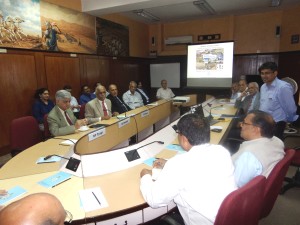USI Blog (Event Update) Round Table Discussion on “Defence Economic Zones: Transforming India’s Military-Industrial Complex” A Round Table Discussion with Mr Ashish Puntambekar, Lead Designer, The Planning and Design Lab, Mumbai on “Defence Economic Zones (DEZs) : Transforming India’s Military-Industrial Complex” was held at USI on 16 Oct 2014. The event was Chaired by Lieutenant General PK Singh, PVSM, AVSM (Retd), Director USI and was attended by General VP Malik, PVSM, AVSM (Retd), former COAS and several other serving and retired persons from the Services, diplomats, bureaucrats and from the DRDO.

The aim of the RTD was to discuss the strategy paper on the subject prepared by Mr Puntambekar and in the process provide him with inputs to further refine the same. Shri Puntambekar gave a Presentation on his concept about the establishment of the DEZs in order to save valuable foreign currency reserves while creating new jobs in the high technology defence sector and also to solve several difficult problems confronting India’s defence manufacturing sector. He proposed creation of six DEZs highlighting the following deliverables :- (a) 75-80 per cent indigenisation of sophisticated military equipment and savings in excess of US$200 billion in foreign exchange by 2025. (b) Massive transformation of India’s military industrial complex, assisted by private sector participation in military-industrial clusters. (c) Unprecedented innovation in defence technologies by co-locating six universities/IIT research departments and full time inter-disciplinary defence engineering courses within DEZs. (d) Creation of 3,00,000 new hi-tech jobs in the defence sector. (e) Enhancing India’s comprehensive national power. The main points that emerged from the discussion were as follows :- (a) India’s experience with Special Economic Zones (SEZs) needs to be studied and looked into. The bottlenecks faced in terms of capital, land acquisition, tax and labour laws, availability of power, talent pool etc. have to be addressed in order to make DEZs a viable concept. (b) The timelines for creating various capabilities need to be reassessed for these to be more realistic. It should take into account the time required for research and development, user trials and to productionize major weapon platforms. (c) The aim of the entire exercise of DEZs is to timely deliver the required weapons and technology to the defence forces; hence, the operational and tactical aspects in terms of what weapon systems are required and in what quantity are best left to the Armed Forces. (d) Greater synergy between various stakeholders needs to be built and for that institutional mechanisms will have to be put in place. (e) The importance of public-private partnership was highlighted. Private companies will have to be provided a level playing field. They will only invest if certain number of orders is assured. (f) It has been experienced that countries do not readily transfer frontier technologies to others. These technologies have to be either indigenously developed or the human resource talent has to be tapped from abroad, cutting through the ‘red tapism’, even if they have to be paid ‘dollar salaries’. The discussion contributed to better understanding of the concept among the participants as also gave some useful inputs to Mr Puntambekar to further refine his Paper. In the end, the Director USI thanked the speaker and the participants. Report compiled by Major Sonali Gupta (Retd), Editorial Assistant at USI.

